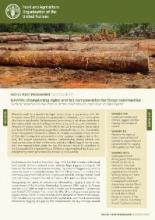/ library resources
Showing items 1 through 9 of 30.As a response to the environmentally and socially destructive practices of post-war mechanization and intensification, the concept of sustainable agriculture has become prominent in research, policy, and practice.
Agriculture is an important type of land use but suffers from drought, especially under global climate change scenarios. Although government is a major actor in helping farmers to adapt to drought, lack of funds has constrained its efforts.
A series of approaches have been proposed for natural resource management and biodiversity conservation in recent decades. In the important forestry sector, two of the most dominant policy paradigms have been multi-purpose forestry and sustainable forest management.
Forestry policy and practice in Britain has been subject to a series of paradigm changes since the establishment of the Forestry Commission in 1919.
Woodland expansion on a significant scale is widely seen to be critical if governments are to achieve their net zero greenhouse gas ambitions. The United Kingdom government is committed to expanding tree cover from 13% to at least 17% in order to achieve net zero by 2050.
Nature-based solutions (NbS) include all the landscape’s ecological components that have a function in the natural or urban ecosystem.
Land degradation is a global issue receiving much attention currently.
Ghana’s work to promote the legal timber trade, in partnership with the European Union (EU), strongly emphasizes involving local communities who live in or near forests.
The Mediterranean region has more than 25 million hectares of Mediterranean forests and about 50 million hectares of other Mediterranean wooded lands.
Paginering
Land Library Search
Through our robust search engine, you can search for any item of the over 73,000 highly curated resources in the Land Library.
If you would like to find an overview of what is possible, feel free to peruse the Search Guide.




